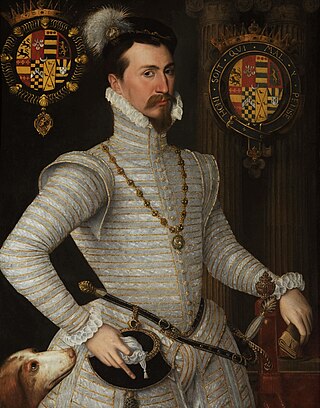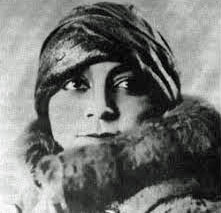Related Research Articles

Robert Dudley, 1st Earl of Leicester, was an English statesman and the favourite of Elizabeth I from her accession until his death. He was a suitor for the queen's hand for many years.

Vance County is a county located in the U.S. state of North Carolina. As of the 2020 census, the population was 42,578. Its county seat is Henderson.

Margaret Oliphant Wilson Oliphant was a Scottish novelist and historical writer, who usually wrote as Mrs. Oliphant. Her fictional works cover "domestic realism, the historical novel and tales of the supernatural".

John Dillard Bellamy Jr. was a Democratic U.S. Congressman from North Carolina between 1899 and 1903.

Joseph Hayne Rainey was an American politician. He was the first black person to serve in the United States House of Representatives and the second black person to serve in the United States Congress. His service included time as presiding officer of the House of Representatives.

Lois Collier was an American actress born in Salley, South Carolina. She was sometimes credited as Lois Collyer.

Caroline Pafford Miller was an American novelist. She gathered the folktales, stories, and archaic dialects of the rural communities she visited in her home state of Georgia in the late 1920s and early 1930s, and wove them into her first novel, Lamb in His Bosom, for which she won the Pulitzer Prize for Fiction in 1934, and the French literary award, the Prix Femina Americain in 1935. Her success as the first Georgian winner of the fiction prize inspired Macmillan Publishers to seek out more southern writers, resulting in the discovery of Margaret Mitchell, whose first novel, Gone with the Wind, also won a Pulitzer Prize for Fiction in 1937. Miller's story about the struggles of nineteenth-century south Georgia pioneers found a new readership in 1993 when Lamb in His Bosom was reprinted, one year after her death. In 2007, Miller was inducted into the Georgia Writers Hall of Fame.

Richard Henderson was an American jurist, land speculator and politician who was best known for attempting to create the Transylvania Colony in frontier Kentucky. Henderson County and its seat Henderson, Kentucky are named for him. He also sold land to an early settlement that went on to become Nashville, Tennessee.
More than 1,500 African American officeholders served during the Reconstruction era (1865–1877) and in the years after Reconstruction before white supremacy, disenfranchisement, and the Democratic Party fully reasserted control in Southern states. Historian Canter Brown Jr. noted that in some states, such as Florida, the highest number of African Americans were elected or appointed to offices after the end of Reconstruction in 1877. The following is a partial list of notable African American officeholders from the end of the Civil War until before 1900. Dates listed are the year that a term states or the range of years served if multiple terms.
The Miss South Carolina competition is the pageant that selects the representative for the state of South Carolina in the Miss America pageant. The pageant was first held in Myrtle Beach and moved to Greenville starting in 1958 and remained in that city until the 1990s. Spartanburg hosted the pageant in a few different venues until new leadership took over the organization and moved the pageant to Columbia, SC in 2011. The pageant was televised since the 1960s until the 1998 pageant. Televising was resumed with the 2000 pageant through 2006. The pageant returned to television in 2014.

William Lamb was an American newspaper editor, politician, businessman, and soldier, noted for his role as a Confederate States Army officer in commanding the Confederate garrison at Fort Fisher at the mouth of the Cape Fear River during the Civil War.

Woman's Home Companion was an American monthly magazine, published from 1873 to 1957. It was highly successful, climbing to a circulation peak of more than four million during the 1930s and 1940s. The magazine, headquartered in Springfield, Ohio, was discontinued in 1957.

Lena Wilson was an American blues singer who performed in the classic female blues style. An African-American, Wilson performed in vaudeville with her brother Danny and his wife, Edith Wilson in the late 1910s and 1920s. Wilson made numerous recordings in the 1920s as a solo artist, for labels such as Black Swan, Paramount, Pathé, Victor, and Vocalion.
The 1888 North Carolina Tar Heels football team represented the University of North Carolina in the 1888 college football season. They played four games with a final record of 1–3. This was the first season the university fielded a football team. The team captains for the 1888 season were Bob Bingham and Steve Bragaw. The game against Wake Forest College was the first in the state, and the game against Trinity College the first "scientific" game in the state. Either is the first intercollegiate game in North Carolina. Princeton star Hector Cowan traveled south at the beginning of 1889 and trained the team for 10-days and was paid $300 the student body collected for that purpose.

Caroline A. Soule, was an American novelist, poet, religious writer, editor, and ordained Universalist minister, who was in 1880 the first woman to be ordained as a minister in the United Kingdom; first president and one of the founders of the Woman's Centenary Aid Association, the earliest national organization of American church women; and the first Universalist Church of America missionary when sent to Scotland in 1878.
Thomas Campbell Darst was the third Bishop of the Episcopal Diocese of East Carolina from 1915 to 1945.

Carrie Belle Kearney was an American temperance reformer, suffragist, teacher, white supremacist, and the first woman elected to the Mississippi State Senate. A Democrat, she served in the state senate in 1924 and 1926. She lived in Flora, Mississippi, and represented Madison County.
South Atlantic was an American magazine published from 1877 to 1882. It was edited by Carrie Jenkins Harris. It started in Wilmington, North Carolina, and then moved to Baltimore.
Carrie Jenkins Harris was a 19th-century Canadian novelist who was born and lived in Nova Scotia.
References
- 1 2 3 4 Macfie, John (1988). "Harris, Caroline (Carrie) Aiken Jenkins". In Powell, William S. (ed.). Dictionary of North Carolina Biography. Retrieved April 4, 2022.
- ↑ Mooring, Phillip Arthur (2006). "Wilson Collegiate Institute". In Powell, William S. (ed.). Dictionary of North Carolina Biography. University of North Carolina Press. Retrieved April 4, 2022.
- ↑ Mott, Frank Luther (August 28, 2023). A History of American Magazines, 1865–1885. Vol. 3. The Belknap Press. pp. 46–47. ISBN 9780674395527.
- ↑ McKeithan, Daniel Morley (1942). "A Correspondence Journal of Paul Hamilton Hayne". The Georgia Historical Quarterly . 26 (3/4): 249–272. JSTOR 40576849.
- ↑ "A Horn Riseth Up from Missouri". The News & Observer . December 29, 1903. p. 1.
- ↑ "Very Sad Death". The Gold Leaf. Henderson, NC. December 31, 1903. p. 3.
- ↑ "Mrs. Harris Laid to Rest". The News & Observer . December 31, 1903. p. 1.
- ↑ Margaret Rosselyn. 1874–1875.
{{cite book}}:|work=ignored (help)